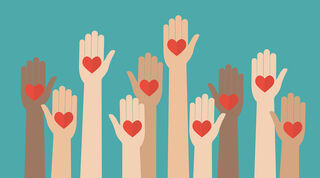Were Humans Born to Be Kind?
Kindness, not aggression, may have been what helped early humans survive. But like violence, friendliness can be a double-edged sword.
By Devon Frye published August 10, 2020 - last reviewed on February 3, 2022

The phrase “survival of the fittest” is often used to paint dominance as the path to success. But aggression, while effective for some, tends to be a costly evolutionary strategy. In their book Survival of the Friendliest, evolutionary anthropologist Brian Hare and journalist Vanessa Woods explain the scientific case that it is, in fact, humans’ capacity for friendliness and cooperation that has helped us thrive—a concept known as self-domestication. But they warn that kindness, like aggression, is a double-edged sword.
How did friendliness give us an advantage over other early humans?
VW: As we grew friendlier, we were growing smarter. The self-domestication hypothesis connects the two, and suggests that our friendliness actually caused our increase in intelligence by allowing us to connect our vast network of minds.
BH: For people to solve problems, they can’t be afraid or aggressive toward one another. When humans started enjoying being around others, all of a sudden they could do things together [feed large groups, develop new tools] that they wouldn’t have been able to do otherwise.
If we evolved to be friendly, how do we explain our great potential for cruelty?
BH: Think of a mama bear: When her cubs are threatened, that’s the most dangerous time to be around her and when she can be the most violent; it’s also when she’s the most loving and nurturing. When humans' offspring, kin, or group are threatened, we become like a mama bear. It’s the same neurobiological mechanism—it’s just been expanded to a wider group of individuals.
How can we harness the upsides of friendliness while mitigating its costs?
BH: The key is socialization. If people from different groups interact, they will naturally form cross-group friendships that immunize them against the worst forms of human nature, like dehumanization and prejudice. That leads to cooperation.
VW: The problem-solving that’s needed now—whether on climate change, COVID, or other challenges—calls for us to work together and share knowledge. There are very few instances where humans are better served going it alone.
Facebook/LinkedIn image: fizkes/Shutterstock
